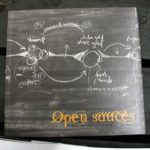Bauhaus meets F/LOSS

Taking it’s inspiration from the Bauhaus Vorkurs1, Xtine Burrough and Michael Mandiberg wrote Digital Foundations2, a textbook for teaching software to designers and artists. Their idea was to not just talk about which button to click, but to connect technical training to color theory and composition. After publisher New Riders had been convinced to apply a Creative Commons license to the book3, it was only a matter of time before the F/LOSS manuals community4 took up the challenge and rewrote Digital Foundations for Gimp, Inkscape, Scribus and other Libre Graphics tools.
Originally, this book was printed as a manual to the Adobe Creative Suite, the software found in classrooms and labs around the country. Just a month after the book was published, we teamed up with Floss Manuals to convert our manuscript into one that teaches the same design principles using open source software.
In addition to explaining well-known Bauhaus principles such as ‘simultaneous contrast’ and ‘quality contrast’, the authors have mixed in snippets from art history, post-modern philosophy, an introduction to fair use and net-art plus more to spice up their detailed step-by-step software exercises. Even though the book was published a few years ago, if you are teaching or learning F/LOSS: this is a nice place to start!
http://en.flossmanuals.net/digital-foundations/
More from my site
- Itten, Johannes. Design and form: the basic course at the Bauhaus. New York: Van Nostrand Reinhold [↩]
- http://www.blog.digital-foundations.net [↩]
- HOWTO Negotiate a Creative Commons License: Ten Steps http://www.blog.digital-foundations.net/?p=53 [↩]
- http://www.flossmanuals.net [↩]






2 Comments ↓
1. Rob Myers
Apr 12, 2011 at 9:59 am
“After publisher New Riders had been convinced to apply a Creative Commons license to the book”
Although sadly a NonCommercial one which also covers FLOSS manuals’ version, making it non-FLOSS.
I thought they were going to fix that?
2. OSP
Apr 12, 2011 at 11:06 am
You are right. The book itself isn’t F/LOSS but the tools discussed in the FLOSS-manuals version are.